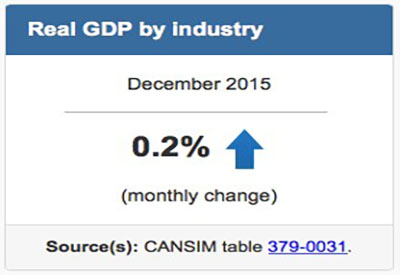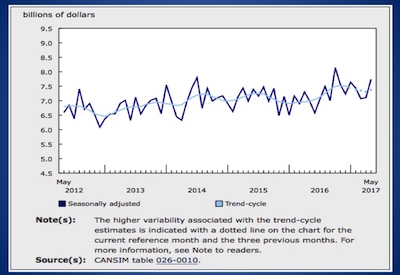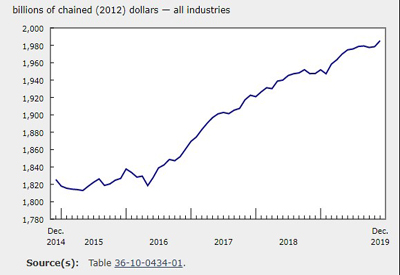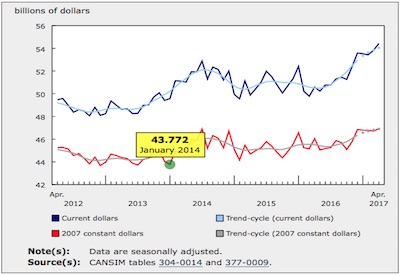Monthly Survey of Manufacturing, February 2022

April 18, 2022
Manufacturing sales increased for the fifth consecutive month, up 4.2% to $67.7 billion in February on higher sales in 14 of 21 industries, led by the motor vehicle (+25.0%), food (+5.3%), petroleum and coal (+6.7%), and wood (+8.5%) industries. Meanwhile, sales of computer and electronic products decrease the most, down 7.9% to $1.2 billion in February. Total manufacturing sales rose 19.5% on a year-over-year basis in February.
Sales in constant dollars increased 2.2% in February, indicating that a higher volume of goods were sold as well as some inflationary pressure as the Industrial Product Price Index rose 3.1% in February.
Production ramps up in motor vehicle assembly plants
Following a 17.7% decline in January, sales of motor vehicles rose 25.0% to $3.7 billion in February, the highest sales since January 2021. Production ramped up in most auto manufacturers in February 2022 despite the ongoing global semiconductor shortage and the blockade of the Ambassador Bridge in Ontario. In February, some highway crossings between Canada and the United States were blocked by protesters against health measures, which in turn reduced trade of auto and auto parts between the two countries, especially at the Ambassador Bridge. However, higher transportation activities at other crossing points partly offset the decline in traffic at the Ambassador Bridge. The blockades contributed to a 5.0% decline in exports of motor vehicles and parts in February.
Following a 1.1% increase in January, sales of food products rose 5.3% to $11.6 billion in February, on higher sales of grain and oilseed milling and meat product manufacturing. The gain observed in the grain and oilseed milling industry in February followed three consecutive monthly declines caused by a shortage of canola seeds and transportation constraints due to poor weather conditions. In February, prices of canola or rapeseed oil were up 40.1% year over year. A reopening of the economy and in particular restaurants contributed to the higher sales of meat products. Total sales of food increased 20.7% year over year.
The petroleum and coal product industry marked a new record sales level in February, rising 6.7% to $8.5 billion, primarily on higher prices. The prices of refined petroleum products rose 9.1% in February, while volumes sold were up 1.6%.
Sales of wood products rose 8.5% to $4.5 billion in February, driven primarily by higher prices and volumes. Wood product sales have been trending upward since September 2021. Prices of lumber and other wood products increased 6.4% in February 2022, while exports of forestry products and building and packaging materials posted a 5.6% gain. Sales of wood in constant dollars increased 5.4% month over month in February.
Sales also increased in the motor vehicle parts (+5.8%) and machinery (+2.6%) industries, while production in the aerospace product and parts industry increased 6.6% in February.
Sales of computer and electronic products decreased 7.9% to $1.2 billion in February, the third consecutive monthly decline and the lowest sales since November 2020. The global shortage of semiconductor chips was partially responsible for the decline.
Other industries that posted lower sales in February were paper product (-2.9%) and ship and boat building (-15.9%).
Protests against health measures impact manufacturing
Based on respondent feedback, the protests against health measures which took place across the country had moderate impacts on manufacturing activities in February. At the national level, the protests impacted about 17.7% of manufacturing plants, mainly through disruptions in transportation (13.2%) and shortages of raw materials (8.3%). The impacts were more pronounced in the motor vehicle and motor vehicle parts industries.
Sales increase in all provinces
Manufacturing sales increased in all provinces in February, led by Ontario, Alberta and British Columbia.
Ontario sales increased 5.1% to $29.1 billion in February, following a 1.3% decline in January. Higher sales of motor vehicle (+27.6%), food (+5.7%), and petroleum (+6.1%) were mainly responsible for the increase. The gains were partially offset by lower sales of computer and electronic products (-17.6%). Year over year, total sales in Ontario were up 17.8% in February.
In Alberta, sales rose 7.2% to $8.4 billion in February, the fifth consecutive monthly increase, on higher sales in 13 of 21 industries led by the petroleum and coal (+12.3%), food (+6.4%), and wood (+16.0%) product industries. Chemical sales marked the largest decrease, down 5.6% to $1.2 billion in February.
Sales in British Columbia increased 3.2% to $5.7 billion in February, primarily on higher sales of wood products (+8.4%). An increase in building and construction activities combined with supply chain disruptions surrounding wood manufactures resulted in higher prices and demand for softwood lumber. On a year-over-year basis, total sales in British Columbia rose 9.4% in February.
Toronto marks the largest increase in sales among selected census metropolitan areas
Manufacturing sales increased in 10 of 12 census metropolitan areas in February, led by Toronto and Edmonton. Meanwhile Québec posted the largest decline.
Following a 0.9% decrease in January, Toronto sales rose 3.7% to $11.3 billion in February, mainly on higher sales of food (+7.2%) and chemicals (+10.0%). The gains were partly offset by declines in sales of petroleum and motor vehicles. Year over year, total sales in Toronto were 18.3% higher in February compared with the same month a year earlier.
Sales in Edmonton increased 8.8% to $3.9 billion in February, the fifth consecutive monthly gain and the highest sales on record. Nearly three-quarters (72%) of the observed monthly gain was attributed to higher sales of petroleum (+11.7%).
In Québec, sales fell 3.7% to $1.9 billion in February on lower sales in the petroleum and coal industry and in miscellaneous manufacturing. The decline in sales of petroleum in February followed a record high in January.
Record-high inventory levels continue
Total inventories increased 1.0% to $106.7 billion in February, mainly on higher inventories in the petroleum and coal product (+9.1%), primary metal (+3.5%), and motor vehicle (+12.8%) industries. Higher prices of raw materials driven mainly by global supply chain disruptions have contributed to the growth in total inventories since January 2021. Year over year, total inventories rose 20.4% in February 2022.
Despite the inventories accumulation, they did not outpace sales and consequently, the inventory-to-sales ratio declined from 1.63 in January to 1.58 in February. This ratio measures the time, in months, that would be required to exhaust inventories if sales were to remain at their current level.
Unfilled orders rise
The total value of unfilled orders rose 0.9% to $100.9 billion in February, the highest level since April 2020, driven mainly by higher unfilled orders of aerospace product and parts (+2.1%) and plastic and rubber (+8.2%).
The total value of new orders increased for the fifth consecutive month, up 2.4% to $68.6 billion in February, led by the motor vehicle (+24.3%), food (+6.0%) and petroleum and coal (+5.7%) product industries. New orders of ship and boat building declined the most.
Capacity utilization rate increases on higher production
The capacity utilization rate (not seasonally adjusted) for the total manufacturing sector rose from 73.7% in January to 76.9% in February on higher production.
The capacity utilization rate increased in 14 of 21 industries in February and was more noticeable in the transportation equipment (+10.6 percentage points), chemical product (+4.5 percentage points) and wood product (+3.7 percentage points) industries. Higher production of motor vehicles and motor vehicle parts contributed to the increase in capacity utilization of transportation equipment. Meanwhile, the capacity utilization rate fell in the non-metallic mineral (-2.3 percentage points), beverage and tobacco (-1.4 percentage points), and computer and electronic (-0.7 percentage points) industries.











